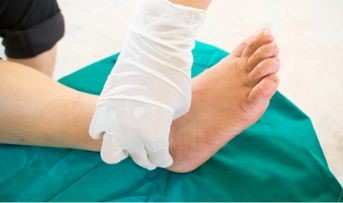Blog Details - Magma HDI

Here are the best ways to diagnose and treat gangrene 21st November 2022
With the changing lifestyle and inconsistent routines, more and more people fall prey to various diseases. These diseases can be by the force of genes, environment, lifestyle, or a combination of all. All these diseases can contribute significantly towards the downfall of health. In the long run, it can lead to serious health issues.
One of these diseases is gangrene. This disease occurs when the tissues in the body die due to loss of blood supply by illness, injury, infection, or other health problems. Usually, the area of impact for this disease lies in the toes, foot, fingers, or limbs. When the condition is extreme, gangrene can also be present in muscles or organs. Different types of gangrene exist, and all of them need medical attention immediately.
Such diseases are highly prevalent in the world. You should protect yourself and your family members against these health adversities, especially look after your parents. To ensure safety, you can invest in the best health insurance in India for parents.
What are the symptoms of gangrene?
Here are the symptoms that you should look for in terms of gangrene.
● Severe pain
● Shriveled or dry skin
● Numb skin
● Inflammation
● Shiny or hairless skin
● Presence of blisters
● Fatigue
● Fever
● Discharge from the affected area
● Red, brown, or purple skin
What are the risk factors of gangrene?
The risk factors are:
● Presence of a weak immune system
● Diabetes
● Smoking
● Severe injury
● Artery disease
● Frostbite
● Obesity
How is gangrene diagnosed?
Once your symptoms are in the open, you must seek medical assistance immediately. Your doctor will ask you about all the possible symptoms and suggest a few diagnostic tests to confirm the disease. These are:
1. Imaging tests:
Imaging tests such as CT scans and MRIs are a great way of determining the spread of gangrene in your body. It also helps to know about possible gas build-up in the tissues.
2. Blood tests:
Blood tests are simple yet effective ways to diagnose gangrene. It helps to know the abnormalities in the blood and in looking at signs of possible infections. It is also based on the presence of WBCs or RBCs in the blood.
3. Cultures:
This is yet another way to diagnose the disease. A part of your tissue, blood, or fluid is taken as a sample. It is then viewed under the microscope to determine tissue damage.
4. Surgery:
It is an elaborate procedure that will help you determine the spread of gangrene in the body. It is suitable for the internal spread of the disease.
What are the ways to treat gangrene?
Every treatment for gangrene focuses on preventing infection spread, removing dead tissue, and total recovery. The ways and means to treat gangrene are:
1. Antibiotics:
Antibiotics are effective in preventing the spread of infection in the body. It can be taken orally or injected into the body through a needle.
2. Surgery:
Through surgery, the dead or infected part of the tissue is removed from the body permanently. It helps prevent the infection's spread to other parts of the body.
3. Oxygen therapy:
This method puts you in a special chamber with oxygen at a higher pressure than usual. It contributes to tissue healing and prevents bacteria growth.
These are the possible ways to treat gangrene successfully after you have been diagnosed with it. People with diabetes, especially the population above 40 years, are at a higher risk of gangrene and need to take extra care by regularly checking their blood sugar level and ensuring that it is controlled. Proper diet, enough sleep, less sugar intake, daily walking, and little physical exercise are needed to keep such diseases at bay.
Regardless, it would help if you always had your health insurance in emergencies. It would help if you buy the best health insurance in India for parents and secure their health with the right coverage for their age.
Click HERE to buy the best health insurance in India for parents.
Disclaimer: The information provided above is for illustrative purposes only. To get more details, please refer to policy wordings and prospectus before purchasing a policy.

